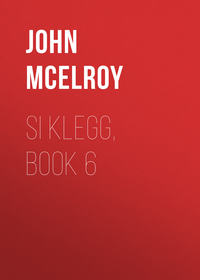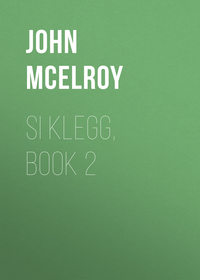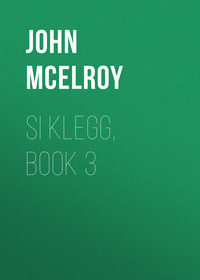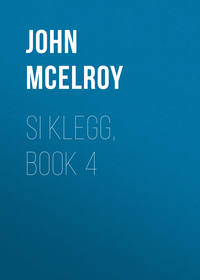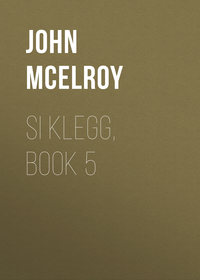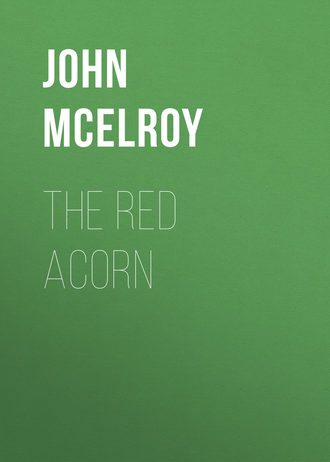 полная версия
полная версияThe Red Acorn
“I’ll admit that there is reason to suspect a strain of selfishness in Rachel’s nature,” said Anna Bayne; “but it’s the only blemish among her many good qualities. Still, I think you do her an injustice in attributing her absence from our meetings to purely selfish motives.”
“Of course, we all know what you mean,” said Elmira. “She set her cap for Harry Glen, and played her cards so openly and boldly—”
“I should say ‘shamelessly,’” interrupted Mrs. Grimes.
“Shamelessly, my dear?” This from Mrs. Tufis, as if in mild expostulation.
“Shamelessly,” repeated Mrs. Grimes, firmly.
“Well, so shamelessly, if you choose,” continued Elmira, “as to incur the ill-will of all the rest of the girls—”
“Whom she beat at a game in which they all played their best,” interrupted Anna.
“That’s an unworthy insinuation,” said Elmira, getting very red. “At least, no one can say I played any cards for that stake.”
“Wasn’t it because all your trumps and suit had been played out in previous games?” This from Mrs. Grimes, whose smarting wounds still called for vengeance.
For an instant a resumption of hostilities was threatened. Mrs. Tufis hastened to interpose:
“There’s no doubt in my mind that the poor, dear girl really took very deeply to heart the stories that have been circulated about Harry Glen’s conduct, though there are people ready to say that she was quite willing to play the role of the stricken one. It really makes her look very interesting. Mourning and the plain style of wearing her hair suit her very, VERY well. I do not think I ever saw her looking so lovely as she has lately, and I have heard quite a number of GENTLEMEN say the same thing.
“If she’d had real spirit,” said Mrs. Grimes, “she’d have dropped Harry Glen without all this heroine-of-a-yellow-covered-novel demonstration, and showed her contempt of the fellow by going ahead just as usual, pretending that his conduct was nothing to her; but she’s a deep one. I’ll venture anything she’s got a well-laid scheme, that none of us dream of.”
“Mrs. Tufis,”—it was the calm, even tones of Rachel Bond’s voice that fell upon the startled ears of the little coterie of gossipers. She had glided in unobserved by them in the earnestness of their debate. “How long has she been here and what has she heard?” was the thrilling question that each addressed to herself. When they summoned courage to look up at her, they saw her standing with perfectly composed mien, her pale face bearing the pensive expression it had worn for weeks. With subdued and kindly manner she returned the affectionate greetings that each bestowed on her, in imitation of Mrs. Tufis, who was the first to recover her wits and then continued:
“Mrs. Tufis, I come to you, as president of this society, to apologize for my absence from so many of your meetings, and to excuse myself on the ground of indisposition.” (Mrs. Grimes darted a significant look at Elmira.) “I also want to announce that, as I have determined to join the corps of nurses for the field hospitals, which Miss Dix, of New York, is organizing, and as I will start for the front soon, I shall have to ask you to excuse me from any farther attendance upon your meetings, and drop my name from your roll.”
She replied pleasantly to a flood of questions and expostulations, which the crowd that gathered around poured upon her, and turning, walked quietly away to her home.
Chapter VI. The Awakening
The nobler nature within him stirred To life, at that woman’s deed and word.– Whittier.Deeper emotions than he had felt before in all his life of shallow aimlessness stirred Harry Glen’s bosom as he turned away from the door which Rachel Bond closed behind her with a decisive promptness that chorded well with her resolute composure during the interview.
This blow fell much more heavily than any that had preceded it, because it descended from the towering height to which he had raised his expectations of an ardent greeting from a loving girl, eagerly watching for his return.
As was to be expected from one of his nature, he forgot entirely his ruminations upon the advisability of discarding her, and the difficulty he experienced in devising a plan whereby this could be done easily and gracefully. He only thought of himself as the blameless victim of a woman’s fickleness. The bitter things he had read and heard of the sex’s inconstancy rose in his mind, as acrid bile sometimes ascends in one’s throat.
“Here,” he said to himself, “is an instance of feminine perfidy equal to anything that Byron ever sneered at. This girl, who was so proud to receive my attentions a little while ago, and who so gladly accepted me for her promised husband, now turns away at the slightest cloud of disapproval falling upon me. And to think, too, how I have given her all my heart, and lavished upon her a love as deep and true as ever a man gave a woman.”
He was sure that he had been so badly used as to have sufficient grounds for turning misanthrope and woman-hater. Thin natures are like light wines and weak syrups in the readiness with which they sour.
The moon had risen as it did on that eventful betrothal-night. Again the stars had sunk from sight in the sea of silver splendor rolling from the round, full orb. Again the roadway down the hill lay like a web of fine linen, bleaching upon an emerald meadow. Again the clear waters of the Miami rippled in softly merry music over the white limestone of their shallow bed. Again the river, winding through the pleasant valley, framed in gently rising hill-sides, appeared as great silver ribbon, decorating a mass of heavily-embroidered green velvet. Again Sardis lay at the foot of the hills, its coarse and common place outlines softened into glorious symmetry by the moonlight’s wondrous witchery.
He stopped for a moment and glanced at the old apple-tree, under which they had stood when
“Their spirits rushed together at the meeting of their lips.”But its raiment of odorous blossoms was gone. Instead, it bore a load of shapeless, sour, unripened fruit. Instead of the freshling springing grass, at its foot was now a coarse stubble. Instead of the delicately sweet breath of violets and fruit blooms scenting the evening air came the heavy, persistent perfume of tuberoses, and the mawkish scent of gaudy poppies.
“Bah, it smells like a funeral,” he said, and he turned away and walked slowly down the hill. “And it is one. My heart and all my hopes lie buried at the foot of that old apple-tree.”
It had been suggested that much of the sympathy we lavish upon martyrs is wanton waste, because to many minds, if not in fact to all, there is a positive pleasure in considering oneself a martyr. More absolute truth is contained in this than appears at the first blush. There are very few who do not roll under their tongues as a sweet morsel the belief that their superior goodness or generosity has brought them trouble and affliction from envious and wicked inferiors.
So the honey that mingled with the gall and hysop of Harry Glen’s humiliation was the martyr feeling that his holiest affections had been ruthlessly trampled upon by a cold-hearted woman. His desultory readings of Byron furnished his imagination with all the woful suits and trappings necessary to trick himself out as a melancholy hero.
On his way home he had to pass the principal hotel in the place, the front of which on Summer evenings was the Sardis forum for the discussion of national politics and local gossip. As he approached quietly along the grassy walk he overheard his own name used. He stepped back into the shadow of a large maple and listened:
“Yes, I seen him as he got off the train,” said Nels Hathaway, big, fat, lazy, and the most inveterate male gossip in the village. “And he is looking mighty well—yes, MIGHTY well. I said to Tom Botkins, here, ‘what a wonderful constitution Harry Glen has, to be sure, to stand the hardships of the field so well.’”
The sarcasm was so evident that Harry’s blood seethed. The Tim Botkins alluded to had been dubbed by Basil Wurmset, the cynic and wit of the village, “apt appreciation’s artful aid.” Red-haired, soft eyed, moon-faced, round of belly and lymphatic of temperament, his principal occupation in life was to play fiddle in the Sardis string-band, and in the intervals of professional engagements at dances and picnics, to fill one of the large splint-bottomed chairs in front of the hotel with his pulpy form, and receive the smart or bitter sayings of the loungers there with a laugh that began before any one else’s, and lasted after the others had gotten through. His laugh alone was as good as that of all the rest of the crowd. It was not a hearty, resonant laugh, like that from the mouth of a strong-lunged, wholesome-natured man, which has the mellow roundness of a solo on a French horn. It was a slovenly, greasy, convictionless laugh, with uncertain tones and ill-defined edges. Its effect was due to its volume, readiness, and long continuance. Swelling up of the puffy form, and reddening ripples of the broad face heralded it, it began with a contagious cackle, it deepened into a flabby guffaw, and after all the others roundabout had finished their cachinnatory tribute it wound up with what was between a roar and the lazy drone of a bagpipe.
It now rewarded Nels Hathaway’s irony, and the rest of the loungers joined in. Encouraged, Nels continued, as its last echoes died away:
“Yes, he’s just as spry and pert as anybody. He seems to have recovered entirely from all his wounds; none of ‘em have disfiggered him any, and his nerves have got over their terrible strain.”
Tim ran promptly through all the notes in his diapason, and the rest joined in on the middle register.
“Well, I’m not at all surprised,” said Mr. Oldunker, a bitter States’ Rights Democrat, and the oracle of his party. “I told you how it’d be from the first. Harry Glen was one of them Wide-Awakes that marched around on pleasant evenings last Fall with oil-cloth capes and kerosene lamps. I told you that those fellows’d be no where when the war they were trying to bring on came. I’m not at all astonished that he showed himself lily-livered when he found the people that he was willing to rob of their property standing ready to fight for their homes and their slaves.”
“Ready to shoot into a crowd of unsuspecting men, you mean,” sneered Basil Wurmset, “and then break their own cursed necks when they saw a little cold steel coming their way.”
Tim came in promptly with his risible symphony.
“Well, they didn’t run away from any cold steel that Harry Glen displayed,” sneered Oldunker.
Tim’s laugh was allegro and crescendo at the first, and staccato at the close.
“You seem to forget that Capt. Bob Bennett was a Wide-Awake, too,” retorted Wurmset, “though you might have remembered it from his having threatened to lick you for encouraging the boys to stone the lamps in the procession.”
Tim cackled, gurgled and roared.
Nels Hathaway had kept silent as long as he could. He must put his oar into the conversational tide.
“I’d give six bits,” he said, “to know how the meeting between him and Rachel Bond passes off. He’s gone up to the house. The boys seen him, all dressed up his best. But his finery and his perfumed hankerchiefs won’t count anything with her, I can tell YOU. She comes of fighting stock, if ever a woman did. The Bonds and Harringtons—her mother’s people—are game breeds, both of ‘em, and stand right on their record, every time. She’ll have precious little traffic with a white-feathered fellow. I think she’s been preparing for him the coldest shoulder any young feller in Sardis’s got for many a long day.”
There was nothing very funny in this speech, but a good deal of risible matter had accumulated in Tim’s diaphragm during its delivery which he had to get rid of, and he did.
Harry had heard enough. While Tim’s laugh yet resounded he walked away unnoticed, and taking a roundabout course gained his room. There he remained a week, hardly coming down to his meals. It was a terrible week for him, for every waking hour of it he walked through the valley of humiliation, and drank the bitter waters of shame. The joints of his hitherto impenetrable armor of self-conceit had been so pierced by the fine rapier thrusts of Rachel’s scorn that it fell from him under the coarse pounding of the village loungers and left him naked and defenseless to their blows. Every nerve and sense ached with acute pain. He now felt all of his father’s humiliation, all his mother’s querulous sorrow, all his betrothed’s anguish and abasement.
Thoughts of suicide, and of flying to some part of the country where he was entirely unknown, crowded upon him incessantly. But with that perversity that nature seemingly delights in, there had arisen in his heart since he had lost her, such a love for Rachel Bond as made life without her, or without her esteem even, seem valueless. To go into a strange part of the country and begin life anew would be to give her up forever, and this he could not do. It would be much preferable to die demonstrating that he was in some degree worthy of her. And a latent manly pride awakened and came to his assistance. He could not be the son of his proud, iron-willed father without some transmission of that sire’s courageous qualities. He formed his resolution: He would stay in Sardis, and recover his honor where he had lost it.
At the end of the week he heard the drums beat, the cannon fire, and the people cheer. The company had come home, and was marching proudly down the street to a welcome as enthusiastic as if its members were bronzed veterans returning victoriously from a campaign that had lasted for years.
His mother told him the next day that the company had decided to re-enlist for three years or duration of the war, and that a meeting would be held that evening to carry the intention into execution. When the evening came Harry walked into the town hall, dressed as carefully as he had prepared himself for his visit with Rachel. He found the whole company assembled there, the members smoking, chatting with their friends, and recounting to admiring hearers the wonderful experiences they had gone through. The enlistment papers were being prepared, and some of the boys who had not been examined during the day were undergoing the surgeon’s inspection in an adjoining room.
Harry was coldly received by everybody, and winced a little under this contrast with the attentions that all the others were given.
At last all the papers and rolls seemed to be signed, and there was a lull in the proceedings. Harry rose from his seat, as if to address the meeting. Instantly all was silence and attention.
“Comrades,” he said, in a firm, even voice, “I have come to say to you that I feel that I made a mistake during our term of service, and I want to apologize to you for my conduct then. More than this, I want to redeem myself. I want to go with you again, and have another chance to–”
He was interrupted by an enthusiastic shout from them all.
“Hurrah! Bully for Lieutenant Glen! Of couse we’ll give you another show. Come right along in your old place, and welcome.”
There was but one dissenting voice. It was that of Jake Alspaugh:
“No, I’ll be durned if we want ye along any more. We’ve no place for sich fellers with us. We only want them as has sand in their craws.”
But the protest was overslaughed by the multitude of assents. At the first interval of silence Harry said:
“No, comrades, I’ll not accept a commission again until I’m sure I can do it credit. I’ll enlist in the company on the same footing as the rest of the boys, and share everything with you. Give the lieutenancy to our gallant comrade Alspaugh, who has richly earned it.”
The suggestion was accepted with more enthusiastic cheering, and Harry, going up to the desk, filled out an enlistment blank, signed it and the company roll, and retired with the surgeon for the physical examination. This finished, he slipped out unnoticed and went to his home. On his way thither he saw Rachel as she passed a brilliantly lighted show-window. She was in traveling costume, and seemed to be going to the depot. She turned her head slightly and bowed a formal recognition.
As their eyes met he saw enough to make him believe that what he had done met her approval.
Chapter VII. Pomp and Circumstances of Glorious War
But man, proud man, Dressed in a little brief authority, Most ignorant of what he’s most assured, Heaven As make the angels weep, who, with our spleens, Would all themselves laugh mortal.—Measure for Measure“Abe, you remember how that man who made the speech when our colors were presented to us talked of ‘the swelling hearts of our volunteers,’ don’t you?” said Kent Edwards, as he and Abe Bolton lounged near the parade-ground one fine afternoon, shortly after the arrival of the regiment in camp of instruction. “You remember that that was his favorite figure of rhetoric, and he repeated it several times?”
“Don’t know anything about figger of retterick,” growled Abe, who, his comrades said, had the evenest temper in the regiment, “for he was always mad. But I do remember that he said that over several times, with a lot o’ other things without much pint to ‘em, until I thought I’d drop, I was so thirsty and tired.”
“Yes? Well, now if you want to get a good idea of what that expression meant, look over there. Not only his heart swells, but he swells all over.”
“I should think he did,” replied Abe, after a moment’s inspection. “Unless his hat has an Injy-rubber band, he’ll have to git it cut offen his head, which ought to be hooped, for it can’t swell no more without busting.”
It was Jacob Alspaugh crossing the parade ground in more than Solomonic splendor of uniform. His inflated form bore upon it all the blue and tinsel prescribed by the Army Regulations for the raiment and insignia of a First Lieutenant of Infantry, with such additions as had been suggested by his exuberant fancy. His blue broadcloth was the finest and shiniest. Buttons and bugles seemed masses of barbric gold. From broad-brimmed hat floated the longest ostrich feather procurable in the shops. Shining leather boots, field-marshal pattern, came above his knees. Yellow gauntlets covered his massive hands and reached nearly to his elbows, and on his broad shoulders were great glittering epaulets—then seldom worn by anyone, and still more rarely by volunteer officers. He evidently disdained to hide the crimson glories of his sash in the customary modest way, by folding it under his belt, but had made of it a broad bandage for his abdominal regions, which gae him the appearance of some gigantic crimson-breasted blue-bird. Behind him trailing, clanking on the ground as he walked, not the modest little sword of his rank, but a long cavalry saber, with glittering steel scabbard. But the sheen of gold and steel was dimmed beside the glow of intense satisfaction with his make-up that shone in his face. There might be alloy in his gleaming buttons and bullion epaulets; there was none in his happiness.
“I feel sorry for the poor lilies of the field that he comes near,” sighed Kent, sympathetically. “He is like them now, in neither toiling nor spinning, and yet how ashamed he must make them of their inferior rainment.”
“Faugh! it makes me sick to see a dunghill like that strutting around in feathers that belong to game birds.”
“O, no; no game bird ever wore such plumage as that. You must be thinking of a peacock, or a bird-of-paradise.”
“Well, then, blast it, I hate to see a peacock hatched all at once out of a slinking, roupy, barnyard rooster.”
“O, no; since circuses are out of the question now, we ought to be glad of so good a substitute. It only needs a brass band, with some colored posters, to be a genuine grand entry, with street parade.”
Alspaugh’s triumphal march had now brought him within a few feet of them, but they continued to lounge indifferently on the musket box upon which they had been sitting, giving a mere nod as recognition of his presence, and showing no intention of rising to salute.
The glow of satisfaction faded from Alspaugh’s horizon, and a cloud overcast it.
“Here, you fellers,” he said angrily, “why don’t ye git up an’ saloot? Don’t ye know your business yit?”
“What business, Jake?” asked Kent Edwards, absently, paying most attention to a toad which had hopped out form the cover of a budock leaf, in search of insects for his supper.
Alspaugh’s face grew blacker. “The business of paying proper respect to your officers.”
“It hasn’t occured to me that I am neglecting anything in that line,” said Kent, languidly, shifting over to recline upon his left elbow, and with his right hand gathering up a little gravel to flip at the toad; “but maybe you are better acquainted with our business than we are.”
Abe contributed to the dialogue a scornful laugh, indicative of a most heartless disbelief in his superior officer’s superior intellectuality.
The dark cloud burst in storm: “Don’t you know,” said Alspaugh, angry in every fiber, “that the reggerlations say that ‘when an enlisted man sees an officer approach, he will rise and saloot, and remain standin’ and gazin’ in a respectful manner until the officer passes five paces beyond him?’ Say, don’t you know that?”
Kent Edwards flipped a bit of gravel with such good aim that it struck the toad fairly on the head, who blinked his bright eyes in surprise, and hopped back to his covert. “I am really glad,” said he, “to know that you have learned SOMETHING of the regulations. Now, don’t say another word about it until I run down to the company quarters and catch a fellow for a bet, who wants to put up money that you can never learn a single sentence of them. Don’t say another word, and you can stand in with me on the bet.”
“Had your head measured since you got this idea into it?” asked Abe Bolton, with well-assumed interest.
“If he did, he had to use a surveyor’s chain,” suggested Kent, flipping another small pebble in the direction of the toad’s retreat.
Alspaugh had grown so great upon the liberal feed of the meat of flattery, that he could hardly make himself believe that he had heard aright, and that these men did not care a fig for himself or his authority. Then recovering confidence in the fidelity of their ears, it seemed to him that such conduct was aggravated mutiny, which military discipline demanded should receive condign punishment on the spot. Had he any confidence in his ability to use the doughy weapon at his side, he would not have resisted the strong temptation to draw his sword and make an example then and there of the contemners of his power and magnificence. But the culprits has shown such an aptitude in the use of arms as to inspire his wholesome respect, and he was very far from sure that they might not make a display of his broadsword an occasion for heaping fresh ridicule upon him. An opportune remembrance came to his aid:
“If it wasn’t for the strict orders we officers got yesterday not to allow ourselves to be provoked under any circumstances into striking our men, I’d learn you fellers mighty quick not to insult your superior officers. I’d bring you to time, I can tell you. But I’ll settle with you yit. I’ll have you in the guard hose on bread and water in short meter, and then I’ll learn you to be respectful and obedient.”
“He means ‘teach,’ instead of ‘learn,’” said Kent, apologetically, to Abe. “It’s just awful to have a man, wearing shoulder-straps, abuse English grammar in that way. What’s grammar done to him to deserve such treatment? He hasn’t even a speaking acquaintance with it.”
“I ‘spose it’s because grammar can’t hit back. That’s the kind he always picks on,” answered Abe.
“You’ll pay for this,” shouted Alspaugh, striding off after the Sargent of the Guard.
At that moment a little drummer appeared by the flagstaff, and beat a lively rataplan.
“That’s for dress-parade,” said Kent Edwards, rising. “We’d better skip right over to quarters and fall in.”
“Wish their dress-parades were in the brimstone flames,” growled Abe Bolton, as he rose to accompany his comrade. “All they’re for is to stand up as a background, to show off a lot of spruce young officers dressed in fancy rigs.”
“Well,” said Kent, lightly, as they walked along, “I kind of like that; don’t you? We make picturesque backgrounds, don’t we? you and I, especially you, the soft, tender, lithe and willowy; and I, the frowning, rugged and adamantine, so to speak. I think the background business is our best hold.”


